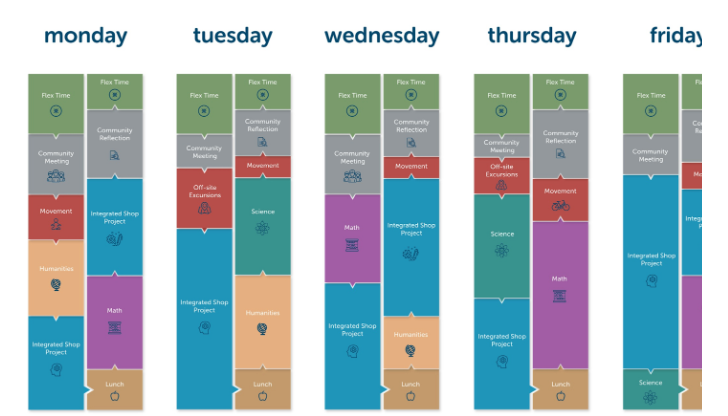Embark Education serves as a launchpad for adolescents’ inherent intellectual curiosity, prepares them for high school, and supports them to understand who they are and how they fit into the world. The model achieves its goals by creating a learning experience that is learner-centered, integrated, and embedded. Learning at Embark’s flagship school is embedded into two North Denver businesses, which grounds students’ academics in real-world situations. Learners benefit from a truly integrated curriculum in which math, English, science, and history are artfully woven together so that no content or skill is learned in isolation. At Embark, learners are at the center and, therefore, are able to capitalize on their strengths while also receiving the guidance needed to meet their academic, social, and emotional needs.
Embark is committed to sharing their unique model as well as learner-centered education more broadly. They offer site visits and 1:1 coaching to schools interested in their model. Additionally, they offer a signature residency that provides education professionals with the time, space, and resources to surface their brilliance while building community with others.
What Makes This Model Innovative?
Relevance
Active Self-Direction
Connection and Commnity
Goals
Embark’s goals are set out in their Learner Profile. Learner Profile It is important to note that the learner profile was created in collaboration with students, centering their desires in school design. The school seeks to prepare learners for both high school and beyond by building the following qualities in learners:
Awareness
Students understand how they show up in the community and world. They understand how their thoughts and actions affect themselves and the people around them. They manage their own emotions and comfortably deal with the emotions of others.
Resilience
Students believe in themselves. They are capable of achieving their goals. They adapt well in difficult times by seeing these as temporary and not letting hard moments stop them.
Courage
Students have strong values. They know who they are and what they stand for. They know what they are capable of achieving and they are confident in meeting the challenges that they face. They will be brave as they encounter new experiences, despite feeling anxious or uncomfortable.
Community Builder
Students value and respect diversity in people. They ensure others feel included and welcomed for all that they are. They listen to get to know others. They offer compassion and support to show they care as we grow and change.
Revolutionary
They make a difference. They fearlessly challenge the status quo and advocate for a dramatic change.
Curiosity
They are eager and interested in learning. They ask questions, and this sparks creativity, imagination, and a desire for the discovery and understanding of new things. They are passionate about what and how they learn.
Experience
Within the Embark Education model, learning experiences are embedded, integrated, and learner-centered. These core principles cut across all aspects of the learning experience.
Authentic environments enable students to ground their academics in real-world situations and to apply their knowledge to address real-time business needs. By embedding our learning in real-world concerns, Embark students are never left asking, “Why am I learning this?” Embedded Learning Video
Students benefit from a truly integrated curriculum in which math, English, science, and history are artfully woven together so that no content or skill is learned in isolation. Integrated Learning Video
Embark is a learner-centered school where students are able to capitalize on their strengths while also receiving the guidance needed to meet their academic, social, and emotional needs. Students are the heart of school. Each learner is unique and they are cocreators in their learning experience rather than passive vessels to be filled with knowledge. Learning opportunities shift with developmental, social, and competency needs as well as students’ personal interests and academic passions. Learner-Centered Video
The Embark model embodies these principles through core academic disciplines, integrated shop projects, learner-centered conferences, and community and reflection time.
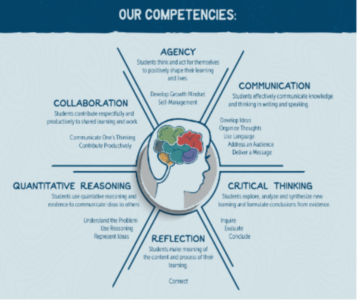 The “why” behind learning at Embark is to support learners to realize the traits set forth in the learner profile. How they do that is through their competencies—a set of skills students need to develop to embody the learner profile. These competencies are: agency, collaboration, communication, critical thinking, quantitative reasoning, and reflection.
The “why” behind learning at Embark is to support learners to realize the traits set forth in the learner profile. How they do that is through their competencies—a set of skills students need to develop to embody the learner profile. These competencies are: agency, collaboration, communication, critical thinking, quantitative reasoning, and reflection.
Competencies were developed because the traits of the learner profile are hard to teach and assess. Competencies represent the skills that can be taught and assessed that underlie the learner profile traits. Progress is measured on a 3-point scale. The 3-point scale is a tool to measure mastery of a specific competency or standard.
- Students are practicing a skill or concept as they work with the educator and their peers to build background knowledge, explore resources, and try things on their own.
- Students are meeting a skill or concept when they effectively use it in an appropriate context.
- Students are extending a skill or concept when they demonstrate deep understanding, are able to apply it on their own, and connect it to other learning.
In a competency-based assessment model, “Practicing” is not a failing score. In fact, many students will receive a “Practicing” score for quite a while as they build their skills. How We Measure Learning Embark students develop these competencies through classroom projects, their work in the shops, and their daily lives. They regularly reflect on their progress toward each competency and receive feedback from peers and educators, and at the time of their graduation, they share their growth story with the community as part of their 8th grade continuation experience.
Literally situated within the walls of two businesses, Embark learners are uniquely positioned to engage in projects that truly integrate academics with real-world situations. Learning experiences at Embark are designed to be responsive to the real needs of the shops, placing learners at the helm of solving needs that have big implications for each business.
F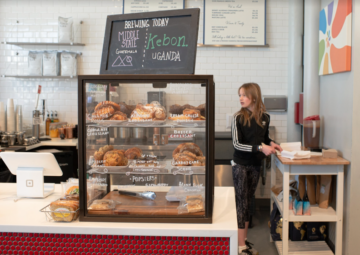 or example, when Pinwheel Coffee needed to source a new coffee roaster, learners were charged with researching and reaching out to local roasters; visiting roasters and hearing their pitches; analyzing each roaster’s pitch, from flavors to finances; and ultimately partnering with shop management to make the final decision. Learners made the congratulatory call to the selected roaster, and the calls to the roasters who were not selected.
or example, when Pinwheel Coffee needed to source a new coffee roaster, learners were charged with researching and reaching out to local roasters; visiting roasters and hearing their pitches; analyzing each roaster’s pitch, from flavors to finances; and ultimately partnering with shop management to make the final decision. Learners made the congratulatory call to the selected roaster, and the calls to the roasters who were not selected.
And when Framework Cycles wanted to bring in products from values-aligned brands? Learners researched and reached out to values-aligned vendors as part of a Socially Conscious Purchasing Project. After communicating with potential suppliers and doing market research, learners brought in helmets from a BIPOC, woman-owned business and T-shirts from a screen print shop that supports and raises money for the LGBTQ+ community. Diversity, Equity, and Inclusion (Student Perspective)
Integrated shop projects include a combination of direct instruction within the core academic disciplines, personalized student exploration, and practical work. They enable students to master foundational academic skills while simultaneously experiencing the application of these skills in the world beyond the classroom.
At Embark, students spend nearly six hours one-on-one with an educator over the course of the year. This is a substantial but highly impactful investment in time. During this time, trusting relationships are forged as young people and educators get to know each other on a personal level. Together, they unpack their successes and challenges, and sit side by side as partners in learning. Students leave with next steps and strategies, and they each have that special feeling of being seen, heard, and valued as an individual.
While conferences have a particular flow, they are a space for young people to get what they need. Conferences often begin with the simple question—“How are you?” before segueing into an update from last week’s chat. Sometimes, that takes up the entirety of the meeting—and that’s okay. Other times, a conference might include looking ahead, perhaps by a student asking for what they need from an adult or together creating a plan of action for meeting a competency. You can read more about Learner-Centered Conferences on Embark’s website. 555 Minutes
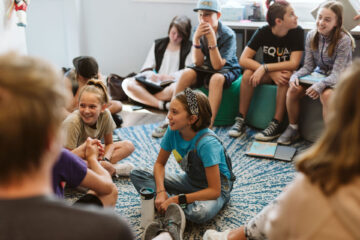 Bookending each day, community meeting and community reflection anchor the student experience. Community meeting serves as a daily check-in, where logistical information is shared and students set their academic and personal intentions for the day. Community reflection provides a daily checkout during which students are able to reflect back on the day’s learning. Both community times provide a structured environment in which students can process their learning, share out their success and/or struggles, and ask for help and guidance from their peers and educators.
Bookending each day, community meeting and community reflection anchor the student experience. Community meeting serves as a daily check-in, where logistical information is shared and students set their academic and personal intentions for the day. Community reflection provides a daily checkout during which students are able to reflect back on the day’s learning. Both community times provide a structured environment in which students can process their learning, share out their success and/or struggles, and ask for help and guidance from their peers and educators.
Supporting Structures
The Embark model can be integrated into a school’s existing overall model but will require certain shifts—some larger than others.
An integrated curricular approach and competency-based assessment are required features of the model.
At Embark, students benefit from a truly integrated curriculum in which math, English, science, and history are artfully woven together so that no content or skill is learned in isolation. In this way, the overall experience at Embark is authentically integrated with the real-world operations of the shops. Purposeful Learning The Common Core math and English standards, as well as Next Generation Science Standards, are used as guardrails and tools to support students to be successful beyond Embark. The curriculum is on a three-year rotation, so students have a robust and well-rounded middle school learning experience.
- Math – 21st Century Problem-Solving: Rooted in the foundation of problem-solving, math comes to life as learners explore budget forecasts and statistical analysis; when there is not a natural integration to the operations of the businesses, lessons are more traditional. With varying levels of math through algebra, students develop deep skills and mathematical language to solve complex and real-world problems.
- Science – Exploration and Experimentation: Science is the language behind the phenomenon of what surrounds us. The integration and exploration of how to actually “do science” is paramount. Students explore, investigate, and question rather than memorize facts as they measure, explore, and experiment with the centripetal force of a banked turn on bikes or the chemistry that makes up good coffee.
- H
 umanities – The Human Experience: Focusing on the human experience is more than a traditional humanities class. While it entails the traditional aspects of reading, writing, and history, it is explored from a foundation of projects that are integral to the entire school experience. When ordering beans, learners study and get to know the history, climate, and politics of the regions they come from. When developing marketing, they learn about the literary elements of fiction. This affords the unique ability to truly interact with and root learning in the surrounding community.
umanities – The Human Experience: Focusing on the human experience is more than a traditional humanities class. While it entails the traditional aspects of reading, writing, and history, it is explored from a foundation of projects that are integral to the entire school experience. When ordering beans, learners study and get to know the history, climate, and politics of the regions they come from. When developing marketing, they learn about the literary elements of fiction. This affords the unique ability to truly interact with and root learning in the surrounding community.
School culture must support students to own their learning and to show up for the community.
Embark Education is rooted firmly in radical trust, fostering relationships, and shifting mindsets, while expanding to explore the profound potential of learner-centered education for youth and adults. Radically Trusting Middle Schoolers Embark has grounded its approach in shared understanding and language around their philosophy, approach, and purpose. Practitioner’s Lexicon In order to establish a learner-centered culture in practice, adults refer to an adapted version of Jim 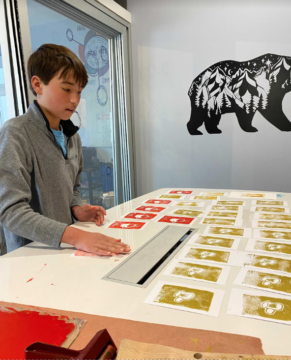 Rickbaugh’s 3 Questions:
Rickbaugh’s 3 Questions:
- “What am I doing that learners could do?”
- “What am I doing that learners should do?””
- “What are the conditions that need to be present in order to facilitate that?”
Furthermore, central to a learner-centered culture is a strong community. Human Connection is the Heart of Learning Embark recognizes that community happens at many levels: within the families served, within classrooms or subjects, within the entire school, within the neighborhood, within the larger city, and so on and so forth. Embark’s learner-centered environment strives to support students in understanding how they show up in each of those spaces. This is done through deep relationships. Trust is a foundational core value that shows up in students creating their own schedule weekly, in the work that they do in the shops—as baristas and mechanics during shop shifts, and in the work they do in integrated shop projects that directly impact shop operations. They see and feel their own impact. Through these experiences they understand that at Embark, trust is given rather than earned.
Adults must hold a learner-centered mindset and put that into action each and every day.
Hiring and developing adults with a dedication to learner-centered teaching practices is key to Embark’s model. Rather than a “sage on the stage,” learner-centered educators adopt the role of content framer, skill coach, and inquiry advisor. This requires that they relinquish control and provide support to students as they lead this process. Read more about one Embark educator’s journey from conventional to learner-centered teaching. Starting from Scratch
Embark is highly collaborative.The entire staff meets weekly as a team to plan for future learning experiences. This time is used to reflect on how the learner profile is being implemented and on the competencies, share new ideas and practices, and use protocols such as critical friends. This time is also used for planning for student growth as a space to also support educator growth and development.
Adults staffing the businesses also have important roles and interact regularly with learners. These shop leaders have a primary focus on what Embark calls “putting bumpers on the bowling alley” of the operations. This means they collaboratively craft experiences with educators where the actions and choices of young people have real-world consequences and impact, but within a framework that allows the businesses to sustain and profit.
As part of the learner-centered community, Embark offers opportunities for education professionals to gather, learn, and share in proximity to others through their Adult Learning Experiences (see Supports Offered). Embark’s offerings provide educators with the time, space, and resources to surface their brilliance and the support and inspiration to create learner-centered environments for youth in their own communities.
A dynamic schedule is essential to a learner-centered environment.
To honor the adolescent brain, the official school day begins at 9:00 a.m. with an all-community meeting. The official school day ends at 3:00 p.m. with a community reflection. However, the learning hub and education team are open and available from 8:00 a.m. until 4:00 p.m. to allow for flexible arrival and departure and provide time in the day for work.
The days at Embark are rarely alike and don’t follow a traditional schedule based on arbitrary blocks of time. Instead they sync with the ebb and flow of the student’s projects and research. Each week, students create their own schedules with the guidance of the education team, who are leveraging the constant and natural learning opportunities within the learning environments to integrate education in a relevant and meaningful way. Developing Learner Agency Through Scheduling
On Monday morning, students receive a blank schedule with only their required, whole-group experiences filled in. Each student adds additional activities for the week, including shop shifts, one-on-ones with educators, personal projects, and collaborative project work blocks. Students are also encouraged to schedule breaks where they might choose to take a walk, play a game with friends or educators who are available, or any other activity. There is also additional blank space left later in the week to allow for adjustments, catchup, and new projects that arise. Since the schedule is built around student needs and learning, every week looks different. Below is an example of how the flow of a week for one student might look:
The model must be embedded in real-world contexts.
Embark Education is embedded in two local businesses—Pinwheel Coffee and Framework Cycles—providing an authentic and mutually beneficial relationship. Pinwheel Coffee Framework Cycles These enterprises sit squarely at the intersection of business, community, and education.
Students do real work in the shops as they shadow employees and are given training that is relevant both to shop operations and their education projects. They are also given ownership over many business decisions as a part of their studies, providing an authentic learning experience. Still, the businesses are fully staffed professional enterprises open to the public, so the focus for Embark students is always on education. The Enterprise Team of baristas and bike mechanics are not teachers, nor are the educators trained baristas or bike mechanics. To make this partnership work, there are thoughtful areas of overlap and synchronicity. The Enterprise Team and the Education Team are mindful and considerate of each other, and carefully dip their toes in each other’s world.
Underpinning this work is Pinwheel and Framework’s deep commitment to the quality of their craft and their connection to youth and learning. Both shops are expanding their internship and apprenticeship programs to learners from across the Denver metro area and hire former students after they graduate Embark and are in high school to work weekend and evening shifts.
While the real world absolutely must be the classroom, additional learning spaces can be complementary.
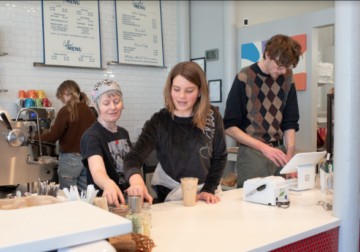 Embark is colocated in two adjacent small business enterprises that double as real-world learning spaces. You will not find desks in rows or traditional classrooms. Instead, the design of the space is referred to as, “socially embedded, open-walled.” Behind the two shops, there is an area called the Learning Hub where learners and the educational team gather, engage, study, and research, but the bulk of learning happens in real-world environments.
Embark is colocated in two adjacent small business enterprises that double as real-world learning spaces. You will not find desks in rows or traditional classrooms. Instead, the design of the space is referred to as, “socially embedded, open-walled.” Behind the two shops, there is an area called the Learning Hub where learners and the educational team gather, engage, study, and research, but the bulk of learning happens in real-world environments.
Students learn mathematical concepts, like proportional relationships and data analysis, by designing new merchandise with experts at local screen printing shops. Learners demonstrate teamwork and problem-solving through organizing community events, like a Bike Rodeo, in collaboration with local elementary schools.
Beyond grading and reporting, technology use can support real-world learning.
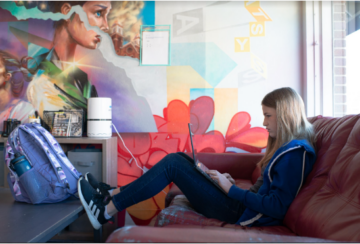 The school operates using Altitude Learning as its learning management system, as it creates customizable opportunities for educators and learners. They also use the LMS to create narrative progress reports and feedback loops with learners.
The school operates using Altitude Learning as its learning management system, as it creates customizable opportunities for educators and learners. They also use the LMS to create narrative progress reports and feedback loops with learners.
Embark also uses Slack at both the adult and adolescent levels for internal communication. This provides yet another opportunity to not just talk about the “real world” but actually function within it as part of the team and community.
Support from community-based organizations can strengthen the educational experience.
Embark is a micro-school with a focused environment and a limited number of students. They have capacity for thirty 6th-, 7th-, and 8th-graders. This small number of students allows for deep connections, personalized experiences, and a profound middle school experience.
Embark opened its doors in 2019 as a tuition-free school. Tuition will be kept as minimal as possible and proceeds from Framework and Pinwheel will supplement or, ideally, mitigate completely the education expenses and need for tuition. Embark (along with Framework Cycles and Pinwheel Coffee) is currently an initiative supported by Great Work Inc., a Denver-based nonprofit organization committed to strengthening education environments. Great Work, Inc. The launch of Embark comes from a foundation grant and the belief that a truly learner-centered model of education that is embedded and integrated into real-world experiences provides an incredible learning experience that will put kids on a path to being lifelong learners.
Communications can be led by students as an additional opportunity for real-world learning.
Embedded learning opens the path to true student ownership of learning. When Pinwheel Coffee wanted to share engaging digital content, Embark learners took charge and created The Pinwheel Post, an entirely student-run blog. Student blog – Pinwheel Coffee All of the written and graphic content is created and edited by students. Student web designers determine the layout of each post. Students on the production management team determine the blog’s publication schedule, keep writers and artists on deadline, and manage the workflow of student editors and fact-checkers. Finally, the blog’s editor-in-chief, also a student, reviews and approves each piece before it goes live—and manages the blog’s yearly budget. Why Embedded Learning is a Game-Changer
The model must be committed to continuous improvement to remain authentic and learner-centered.
Even before Embark’s inception, Great Work Inc. and the enterprises were committed to the continuous improvement of a model that was truly learner-centered and authentic. A Journey to Radically Change the Way Business, Education, and Community Intersect A journey to radically change the way business, education, and community intersect The Embark team and its entire ecosystem is committed to the evolution of the model and, in doing so, regularly pilot ideas, reflect on data, listen to diverse perspectives, and iterate as needed. From a Beautiful Idea to a Living, Breathing, Learning Environment
An integrated curricular approach and competency-based assessment are required features of the model.
At Embark, students benefit from a truly integrated curriculum in which math, English, science, and history are artfully woven together so that no content or skill is learned in isolation. In this way, the overall experience at Embark is authentically integrated with the real-world operations of the shops. Purposeful Learning The Common Core math and English standards, as well as Next Generation Science Standards, are used as guardrails and tools to support students to be successful beyond Embark. The curriculum is on a three-year rotation, so students have a robust and well-rounded middle school learning experience.
- Math – 21st Century Problem-Solving: Rooted in the foundation of problem-solving, math comes to life as learners explore budget forecasts and statistical analysis; when there is not a natural integration to the operations of the businesses, lessons are more traditional. With varying levels of math through algebra, students develop deep skills and mathematical language to solve complex and real-world problems.
- Science – Exploration and Experimentation: Science is the language behind the phenomenon of what surrounds us. The integration and exploration of how to actually “do science” is paramount. Students explore, investigate, and question rather than memorize facts as they measure, explore, and experiment with the centripetal force of a banked turn on bikes or the chemistry that makes up good coffee.
- H
 umanities – The Human Experience: Focusing on the human experience is more than a traditional humanities class. While it entails the traditional aspects of reading, writing, and history, it is explored from a foundation of projects that are integral to the entire school experience. When ordering beans, learners study and get to know the history, climate, and politics of the regions they come from. When developing marketing, they learn about the literary elements of fiction. This affords the unique ability to truly interact with and root learning in the surrounding community.
umanities – The Human Experience: Focusing on the human experience is more than a traditional humanities class. While it entails the traditional aspects of reading, writing, and history, it is explored from a foundation of projects that are integral to the entire school experience. When ordering beans, learners study and get to know the history, climate, and politics of the regions they come from. When developing marketing, they learn about the literary elements of fiction. This affords the unique ability to truly interact with and root learning in the surrounding community.
School culture must support students to own their learning and to show up for the community.
Embark Education is rooted firmly in radical trust, fostering relationships, and shifting mindsets, while expanding to explore the profound potential of learner-centered education for youth and adults. Radically Trusting Middle Schoolers Embark has grounded its approach in shared understanding and language around their philosophy, approach, and purpose. Practitioner’s Lexicon In order to establish a learner-centered culture in practice, adults refer to an adapted version of Jim  Rickbaugh’s 3 Questions:
Rickbaugh’s 3 Questions:
- “What am I doing that learners could do?”
- “What am I doing that learners should do?””
- “What are the conditions that need to be present in order to facilitate that?”
Furthermore, central to a learner-centered culture is a strong community. Human Connection is the Heart of Learning Embark recognizes that community happens at many levels: within the families served, within classrooms or subjects, within the entire school, within the neighborhood, within the larger city, and so on and so forth. Embark’s learner-centered environment strives to support students in understanding how they show up in each of those spaces. This is done through deep relationships. Trust is a foundational core value that shows up in students creating their own schedule weekly, in the work that they do in the shops—as baristas and mechanics during shop shifts, and in the work they do in integrated shop projects that directly impact shop operations. They see and feel their own impact. Through these experiences they understand that at Embark, trust is given rather than earned.
Adults must hold a learner-centered mindset and put that into action each and every day.
Hiring and developing adults with a dedication to learner-centered teaching practices is key to Embark’s model. Rather than a “sage on the stage,” learner-centered educators adopt the role of content framer, skill coach, and inquiry advisor. This requires that they relinquish control and provide support to students as they lead this process. Read more about one Embark educator’s journey from conventional to learner-centered teaching. Starting from Scratch
Embark is highly collaborative.The entire staff meets weekly as a team to plan for future learning experiences. This time is used to reflect on how the learner profile is being implemented and on the competencies, share new ideas and practices, and use protocols such as critical friends. This time is also used for planning for student growth as a space to also support educator growth and development.
Adults staffing the businesses also have important roles and interact regularly with learners. These shop leaders have a primary focus on what Embark calls “putting bumpers on the bowling alley” of the operations. This means they collaboratively craft experiences with educators where the actions and choices of young people have real-world consequences and impact, but within a framework that allows the businesses to sustain and profit.
As part of the learner-centered community, Embark offers opportunities for education professionals to gather, learn, and share in proximity to others through their Adult Learning Experiences (see Supports Offered). Embark’s offerings provide educators with the time, space, and resources to surface their brilliance and the support and inspiration to create learner-centered environments for youth in their own communities.
A dynamic schedule is essential to a learner-centered environment.
To honor the adolescent brain, the official school day begins at 9:00 a.m. with an all-community meeting. The official school day ends at 3:00 p.m. with a community reflection. However, the learning hub and education team are open and available from 8:00 a.m. until 4:00 p.m. to allow for flexible arrival and departure and provide time in the day for work.
The days at Embark are rarely alike and don’t follow a traditional schedule based on arbitrary blocks of time. Instead they sync with the ebb and flow of the student’s projects and research. Each week, students create their own schedules with the guidance of the education team, who are leveraging the constant and natural learning opportunities within the learning environments to integrate education in a relevant and meaningful way. Developing Learner Agency Through Scheduling
On Monday morning, students receive a blank schedule with only their required, whole-group experiences filled in. Each student adds additional activities for the week, including shop shifts, one-on-ones with educators, personal projects, and collaborative project work blocks. Students are also encouraged to schedule breaks where they might choose to take a walk, play a game with friends or educators who are available, or any other activity. There is also additional blank space left later in the week to allow for adjustments, catchup, and new projects that arise. Since the schedule is built around student needs and learning, every week looks different. Below is an example of how the flow of a week for one student might look:
The model must be embedded in real-world contexts.
Embark Education is embedded in two local businesses—Pinwheel Coffee and Framework Cycles—providing an authentic and mutually beneficial relationship. Pinwheel Coffee Framework Cycles These enterprises sit squarely at the intersection of business, community, and education.
Students do real work in the shops as they shadow employees and are given training that is relevant both to shop operations and their education projects. They are also given ownership over many business decisions as a part of their studies, providing an authentic learning experience. Still, the businesses are fully staffed professional enterprises open to the public, so the focus for Embark students is always on education. The Enterprise Team of baristas and bike mechanics are not teachers, nor are the educators trained baristas or bike mechanics. To make this partnership work, there are thoughtful areas of overlap and synchronicity. The Enterprise Team and the Education Team are mindful and considerate of each other, and carefully dip their toes in each other’s world.
Underpinning this work is Pinwheel and Framework’s deep commitment to the quality of their craft and their connection to youth and learning. Both shops are expanding their internship and apprenticeship programs to learners from across the Denver metro area and hire former students after they graduate Embark and are in high school to work weekend and evening shifts.
While the real world absolutely must be the classroom, additional learning spaces can be complementary.
 Embark is colocated in two adjacent small business enterprises that double as real-world learning spaces. You will not find desks in rows or traditional classrooms. Instead, the design of the space is referred to as, “socially embedded, open-walled.” Behind the two shops, there is an area called the Learning Hub where learners and the educational team gather, engage, study, and research, but the bulk of learning happens in real-world environments.
Embark is colocated in two adjacent small business enterprises that double as real-world learning spaces. You will not find desks in rows or traditional classrooms. Instead, the design of the space is referred to as, “socially embedded, open-walled.” Behind the two shops, there is an area called the Learning Hub where learners and the educational team gather, engage, study, and research, but the bulk of learning happens in real-world environments.
Students learn mathematical concepts, like proportional relationships and data analysis, by designing new merchandise with experts at local screen printing shops. Learners demonstrate teamwork and problem-solving through organizing community events, like a Bike Rodeo, in collaboration with local elementary schools.
Beyond grading and reporting, technology use can support real-world learning.
 The school operates using Altitude Learning as its learning management system, as it creates customizable opportunities for educators and learners. They also use the LMS to create narrative progress reports and feedback loops with learners.
The school operates using Altitude Learning as its learning management system, as it creates customizable opportunities for educators and learners. They also use the LMS to create narrative progress reports and feedback loops with learners.
Embark also uses Slack at both the adult and adolescent levels for internal communication. This provides yet another opportunity to not just talk about the “real world” but actually function within it as part of the team and community.
Support from community-based organizations can strengthen the educational experience.
Embark is a micro-school with a focused environment and a limited number of students. They have capacity for thirty 6th-, 7th-, and 8th-graders. This small number of students allows for deep connections, personalized experiences, and a profound middle school experience.
Embark opened its doors in 2019 as a tuition-free school. Tuition will be kept as minimal as possible and proceeds from Framework and Pinwheel will supplement or, ideally, mitigate completely the education expenses and need for tuition. Embark (along with Framework Cycles and Pinwheel Coffee) is currently an initiative supported by Great Work Inc., a Denver-based nonprofit organization committed to strengthening education environments. Great Work, Inc. The launch of Embark comes from a foundation grant and the belief that a truly learner-centered model of education that is embedded and integrated into real-world experiences provides an incredible learning experience that will put kids on a path to being lifelong learners.
Communications can be led by students as an additional opportunity for real-world learning.
Embedded learning opens the path to true student ownership of learning. When Pinwheel Coffee wanted to share engaging digital content, Embark learners took charge and created The Pinwheel Post, an entirely student-run blog. Student blog – Pinwheel Coffee All of the written and graphic content is created and edited by students. Student web designers determine the layout of each post. Students on the production management team determine the blog’s publication schedule, keep writers and artists on deadline, and manage the workflow of student editors and fact-checkers. Finally, the blog’s editor-in-chief, also a student, reviews and approves each piece before it goes live—and manages the blog’s yearly budget. Why Embedded Learning is a Game-Changer
The model must be committed to continuous improvement to remain authentic and learner-centered.
Even before Embark’s inception, Great Work Inc. and the enterprises were committed to the continuous improvement of a model that was truly learner-centered and authentic. A Journey to Radically Change the Way Business, Education, and Community Intersect A journey to radically change the way business, education, and community intersect The Embark team and its entire ecosystem is committed to the evolution of the model and, in doing so, regularly pilot ideas, reflect on data, listen to diverse perspectives, and iterate as needed. From a Beautiful Idea to a Living, Breathing, Learning Environment
Supports Offered
Embark Education offers the following support to help you implement their approach.
Iterative Space Residency
Funding Available
Embark’s Iterative Space Residency is designed to elevate and honor professional educators by providing them with the time, space, and resources to surface their brilliance. The Iterative Space Residency is a six-week program that gathers motivated educators to build upon their ideas, sparks, and passion in proximity to others who are doing the same. Embark provides residents with a beautifully stocked space, access to resources, and a stipend for their time. All it asks in return is that participants pause each day for a shared, catered, lunch; iterate on their work; and share their insights and discoveries.
Embedded Learning Experience
Cost Associated
Embark’s Embedded Learning Experience is a formal opportunity for education professionals to visit Embark and experience a learner-centered environment in action. The Embedded Experience is intended to help others see and feel more fully how Embark approaches learning; to show others the practices Embark has in place to create a learner-centered environment; and to support others in considering new possibilities for their respective communities.
Consulting
Cost Associated
Embark’s consulting practice supports the cultivation of learner-centered mindsets and practices. Through extended engagements that allow the Embark team to get deeply acquainted with your unique context, Embark provides personalized support and co-created goals to help you identify and meet your objectives for your community.
Reach
Embark’s intention is not to scale or replicate what they do, but to be an example of what is possible when you rethink learning, business, and community and their intersections. When Embark thinks about reach, they are not thinking about the number of schools they start or the number of students they reach but how they resist the gravitational pull of traditional school systems to reimagine what learning looks like for youth and adults. In thinking about reach, Embark hopes to engage with others to share their work and support them in thinking about what a learner-centered paradigm might look like in their own context.
Impact
Embark students consistently rate their experience at school higher than national norms.
The Leaps Student Voice Survey asks students to reflect on and rate their experiences at school through the lens of Transcend’s 10 Leaps for Equitable, 21st-Century Learning. Transcend’s 10 Leaps To date, the survey has been administered to more than 40,000 students across the country and Embark students rate their experience much higher than national norms across all 10 of the Leaps. Embark Leaps Survey Data
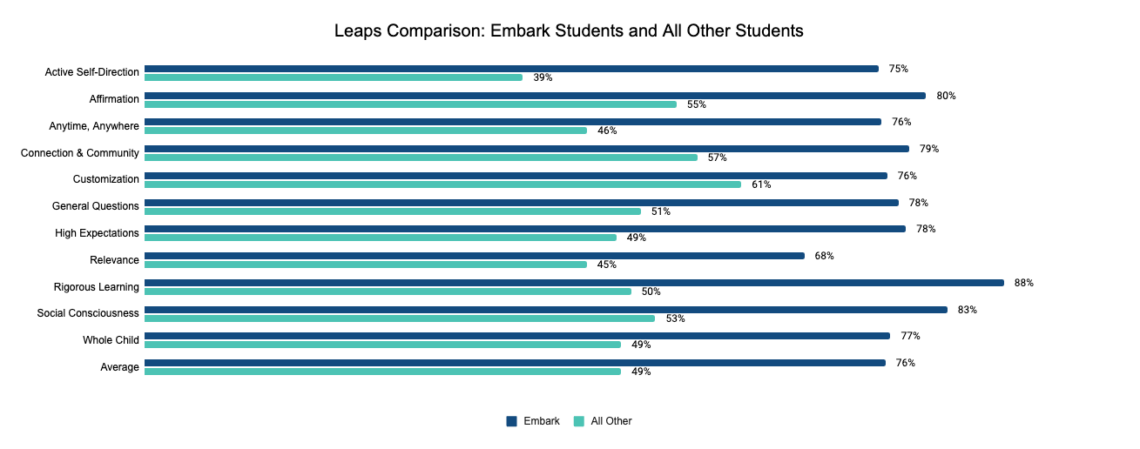
Below are more details on the four Leaps against which Embark most outperformed the national average:
- At Embark, 75% of learners experience active self-direction, compared to 41% of other Grade 6–8 learners surveyed. Some example responses are:
- 84% of learners at Embark feel that they have a say about what happens to them at school (compared to 29%).
- 81% of learners at Embark feel that they have choices when it comes to different ways to complete assignments (compared to 36%).
- 68% of learners at Embark feel that learning is relevant, compared to 37% of other Grade 6–8 learners surveyed. For example:
- 81% of learners feel that what they are learning is connected to life outside the classroom (compared to 31%).
- At Embark, 79% of learners feel that their learning environment fosters community and connection, compared to 50% of other Grade 6–8 learners surveyed. Some testaments to this are:
- 84% of learners at Embark feel that they are part of their school community and people know and care about them (compared to 52%).
- The vast majority of learners at Embark—exactly 90%—feel comfortable at school (compared to 52%).
- An impressive 88% of learners at Embark feel that their schoolwork is rigorous, compared to just 49% of other Grade 6–8 learners surveyed. For example:
- 94% of Embark learners agreed that at school they use their thinking skills rather than just memorizing things (compared to 55%).
Students and parents see and feel the powerful and lasting impact of the student experiences at Embark.
“We are not just working in a bike shop and coffee shop. We also learn the science, math, and communication behind it all, and we’re pushing our thinking all the time.” – Embark Learner
“When I think about Embark, the first thing that comes to mind is creativity and freedom.” – Embark Learner
“Embark changed who I was as a person and taught me many valuable things. For example a lot of ways to self-direct. And now that I’m here at [high school], I can bloom with the skills that Embark taught me.“ – Embark Alum
“I love that at Embark, I can have personal connections. I feel like my educators really know me, and I know them.” – Embark Learner
“Embark recognizes that every person needs something different at different times. They don’t tell learners what we need but provide options so that we can choose for ourselves.” – Embark Learner



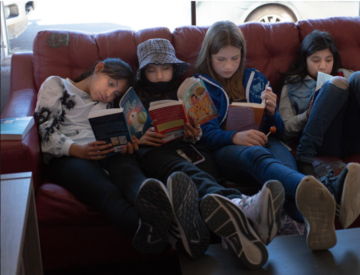 umanities – The Human Experience:
umanities – The Human Experience: 